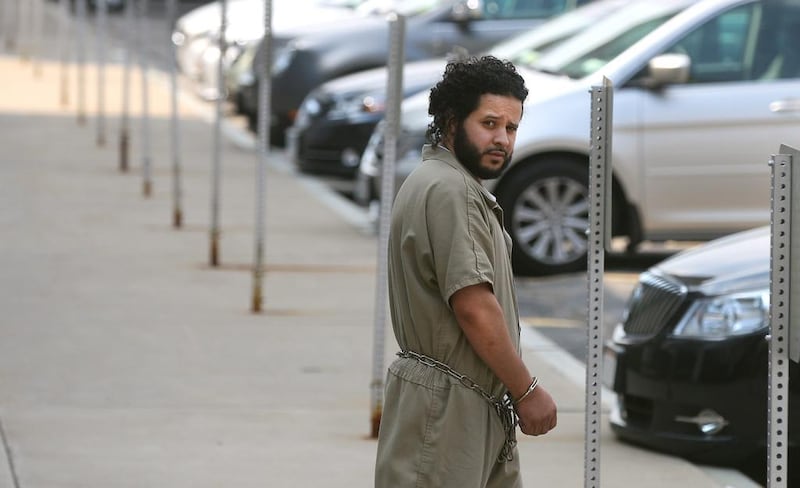A former British intelligence chief and a prominent Muslim campaigner against radicalisation have called for an amnesty for disillusioned western recruits to extreme Islamist groups who fear imprisonment if they return home.
Dozens of young people from Britain alone are estimated by an academic research group to have expressed a wish to abandon the conflict in Syria and Iraq before it is too late.
Analysts say that if this figure is correct, many more recruits among the many nationalities drawn to ISIL and other militant groups almost certainly feel the same.
Up to 9,000 foreigners are estimated by the International Centre for the Study of Radicalisation (ICSR) based at King’s College, London, to have travelled to the Middle East, initially to fight the Syrian regime of Bashar Al Assad.
Although ICSR calculates that 70 pert cent are from the Middle East and North Africa, this leaves a substantial minority from western countries.
Richard Barrett, former global anti-terrorism director of the British military intelligence service MI6, says those who have not committed serious crimes while overseas should be “encouraged” to believe there is a place for them other than in jail if they voluntarily return.
Immunity from prosecution should also depend, Mr Barrett argues, on a willingness to cooperate with the authorities. He believes such individuals could offer vital information as well as powerful counter-propaganda messages to would-be recruits.
He says former extremists are often the most successful in “undermining the terrorist narrative”, and far better equipped than officials and politicians to provide credible accounts of brutality and motivations.
“It seems to me crazy not to use this tool,” Mr Barrett, co-founder of the group that became the United Nations Counter-Terrorism Implementation Task Force, told The National.
He acknowledged the public and political clamour for the punishment of those who have committed crimes, but said even they should be given credit, with lesser sentences, if willing to speak out against extremist groups.
Details of individuals who wish to repent and return are sketchy at best. The ICSR estimates there may be 40 such cases among British recruits, based on the testimony of a small number speaking on behalf of others, and Mr Barrett said it was not surprising that young people lured by social media boasts about “having a great time in Raqqa” should quickly become disillusioned by “the reality of war – boredom, fear, blood and dirt”.
Alyas Karmani, co-director of the anti-radicalisation group Street, based in London and Bradford, a northern English city with a large Muslim population, goes further than Mr Barrett.
He says even those who have committed specific crimes, but under coercion and intimidation, should be spared punishment and treated as victims, not unlike the child soldiers forced to take part in horrific acts in African conflicts.
“In a lot of cases, we are talking about children or vulnerable young adults,” he said. “It therefore becomes a protection and safety issue. With any other category of people, the government would be working to get them back, help them escape. Instead, their approach is basically, ‘let them die, let them be killed’, and this is completely unacceptable.”
He said impressionable young people were being misled into thinking they were going to help victims of Assad repression. Then they found themselves trapped in the clutches of “a bunch of criminal and thugs” but risked being butchered as traitors if they showed disloyalty.
“If they can come back to the UK, there are thorough assessment procedures and they can be successfully de-radicalised and pose no further threat,” he said.
Even before the gruesome murder of the British aid worker David Haines, and threats to kill another humanitarian volunteer, Alan Hemming, many voices were being raised against making concessions to former combatants.
The Quilliam Foundation, an anti-extremist UK organisation created by Maajid Nawaz, a former member of the revolutionary Islamist group Hizb ut-Tahrir but now a parliamentary candidate for the centrist Liberal Democrats, opposes anything approaching an amnesty.
Ghaffa Hussain, the foundation’s managing director and co-author of a recent report on radicalisation, said he saw a good case for lighter sentences for those who helped the authorities or became active in discouraging others.
More than that would set a dangerous precedent, he said, urging disenchanted individuals to “put themselves at the mercy of the justice system”.
Peter McKay, a columnist for the right-wing Daily Mail newspaper, said “returning jihadists should be put on trial for terrorist crimes committed by Islamic State on the legal basis of joint enterprise”.
“In other words, they fought for an organisation that killed hostages,” he wrote. “They share collective responsibility for these crimes.”
Public opinion has been hardened by reports and images of the savagery shown by ISIL, apparently including some of its British recruits, towards hostages, civilians and prisoners of war.
Some analysts have suggested young people may be confused because western governments also supported the removal of Assad. But as ISIL’s actions have become better documented, its own supporters happy to boast about their brutality, this argument has lost force.
French television this week showed a Muslim woman, originally from France, making an online telephone call home from Mosul, the northern Iraqi city captured by ISIL in June, insisting television reports were “all false” or exaggerated and telling her mother she would never return.
The French interior minister, Bernard Cazeneuve, told the Journal du Dimanche newspaper last weekend that “930 French citizens or foreigners usually resident in France are today involved in jihad in Iraq and Syria”. France and Britain have led western countries in announcing plans for tough new travel restrictions on people suspected of radicalisation.
foreign.desk@thenational.ae






